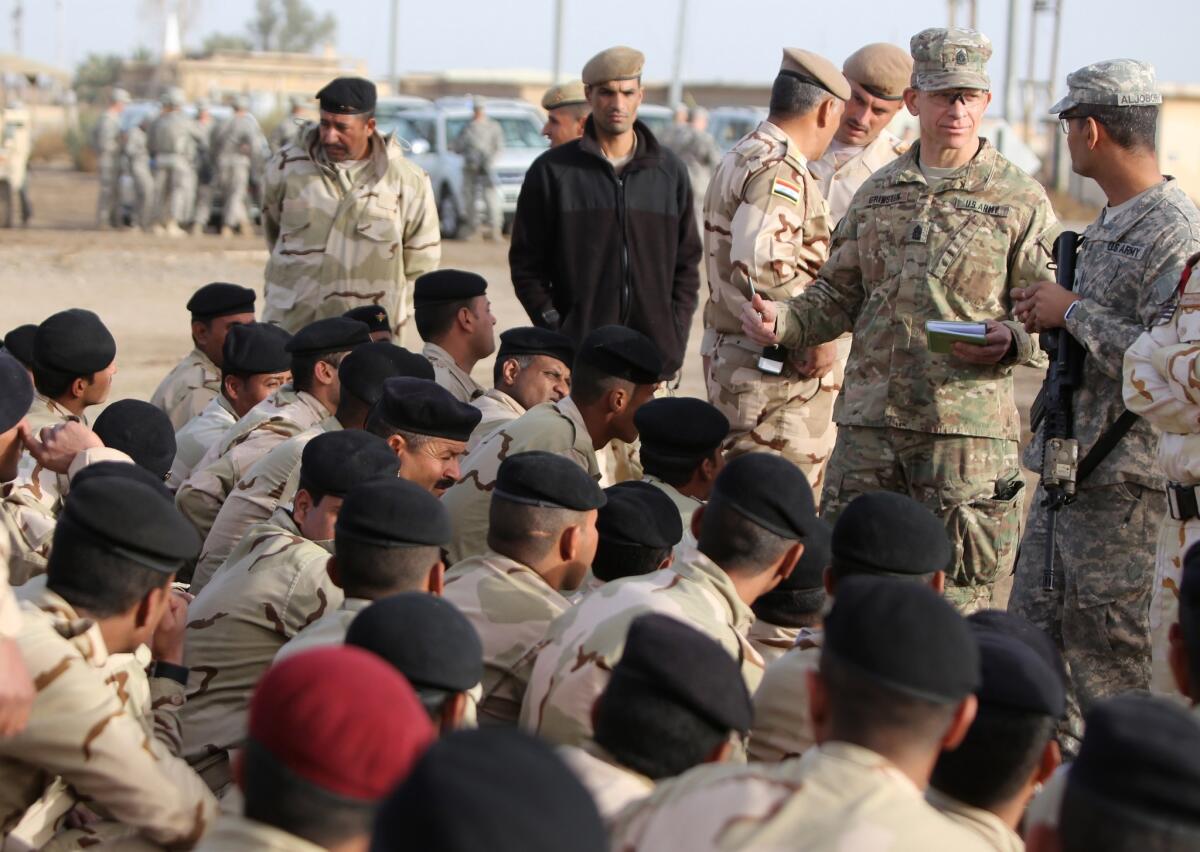Op-Ed: Translating trust in Iraq, one Arabic greeting at a time

- Share via
The United States has sent its most potent weapon to Iraq to battle Islamic State. She’s a 5-foot-6-inch, 60-year-old grandmother. When I served as a military advisor to Iraqi security forces in 2011, Um Safa was our cavalry battalion’s chief interpreter. She accompanied the commander to meetings, endured the same risks he did and did the same for me. I have since retired from the Army, and she returned to her family and civilian life in the United States. When she emailed me in January that she would soon be shipping out to Iraq, I called her to connect again, our first conversation in two years.
Um Safa is not her real name, but it’s how Iraqis knew her when we served together. Like most interpreters, she took on a nom de guerre for safety, to conceal her real identity. Because hers means “mother of Safa,” her daughter’s middle name, it personalized her while shrouding her identity from our Iraqi partners. And it’s how I addressed her when I called her. I greeted her in Arabic, the way she’d taught me to.
To teach an American soldier to greet an Iraqi in her native tongue is a rare and powerful talent in this war. Our conflicts in Iraq and Afghanistan are complex things where firepower alone cannot save the day. Interactions with the locals, with the enemy and especially with one’s allies take on extreme significance.
Guns destroy, but interactions can build. And cooperation between groups is what is needed now, because building a military force and perhaps a stable country was and is the goal.
When we were not among the local Iraqis, I knew Um Safa as Marlene, the actress-inspired name that was a gift from her father. He was an Assyrian Christian and cosmopolitan film distributor who cultivated her love for the English language. After graduating college in Baghdad, she moved to the U.S. in 1979, became a citizen and began the family that blossomed in Los Angeles, the family she left in 2009 to become an interpreter to U.S. troops.
This soft-spoken woman became a wonderful example of the strength America gains from its immigrants — the constantly regenerating fluency in understandings, cultures and languages that provides a bridge to the countries of their birth.
Marlene was integral to maintaining our relationships with local Iraqi leaders, with police chiefs, army generals and governors. Though U.S. Army units rotated in and out of Camp Kalsu, she remained a constant, stabilizing and calming American presence for our Iraqi counterparts.
She helped us avoid cultural missteps — such as showing the bottom of one’s boot, an affront in the Muslim world — and taught us how to craft relationships. Although American business dealings can be efficient and frank, those in Iraq begin with meandering small talk and tea drinking. Marlene helped us understand that.
She graciously conducted impromptu Arabic sessions with me at her small desk in the battalion headquarters. One of her most useful gifts to me was a turn of phrase with profound cultural resonance. In the giving and receiving of greetings, one often asks “How are you?” In Arabic, Alhamdulillah (“all praise to God”) is a common response.
But Marlene taught me a far more Iraqi reply: Fog al nakhal, literally “at the top of the palm tree.” It refers to a timeless Iraqi love song, and also indicates that the speaker has a perch above everything, enjoying peace and a commanding view. This answer always won me at least a surprised look, but more often a wide smile or even a belly laugh. From this simple root, a conversation sprouts. From a conversation, goodwill; from goodwill, trust. And now, as during my last tour in Iraq, trust is in short supply.
These days, real conversations between Americans and Iraqis are more necessary than materiel. Unlike ammunition and fuel, trust can’t be manufactured and shipped in; it must be cultivated. Cultural guides such as Marlene are what allow it to grow.
Marlene has undertaken a sacrifice — separation from her family, a Spartan existence and significant bodily risk. After two tours of my own there and for complex reasons, my heart’s not in it anymore, but she’s returning again.
She seems unable to give up her bond with the place. She once showed me a picture of 1950s-era Baghdad, with a traffic circle, water fountain, lush greenery and strolling citizens. The scene could have depicted any peaceful mid-20th century city. “This is what it used to be like,” she murmured wistfully. “It used to be so beautiful here, before they ruined it.” I don’t know what she dreams for Iraq, but she has returned to make it better somehow.
At the end of our conversation, my teacher bid me goodbye: Masalama.
And I returned with another phrase she had taught me: Allah wiach — God go with you.
Michael W. Brough, a freelance writer, is co-editor of the book “Rethinking the Just War Tradition.”
Follow the Opinion section on Twitter @latimesopinion and Facebook
More to Read
A cure for the common opinion
Get thought-provoking perspectives with our weekly newsletter.
You may occasionally receive promotional content from the Los Angeles Times.









